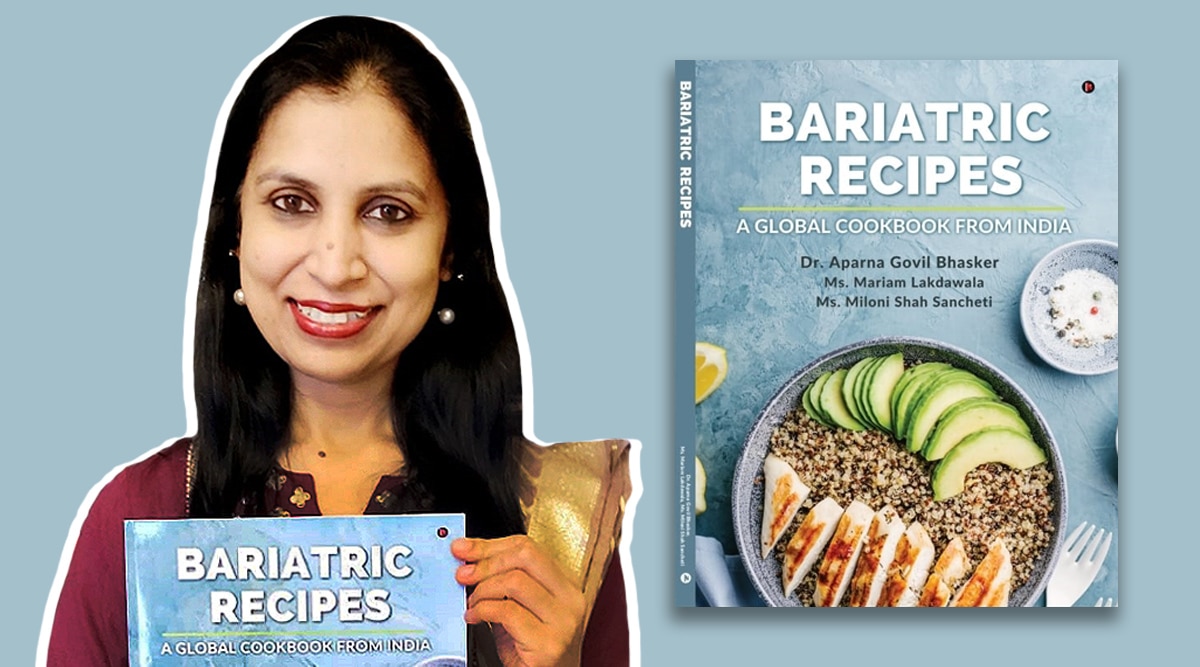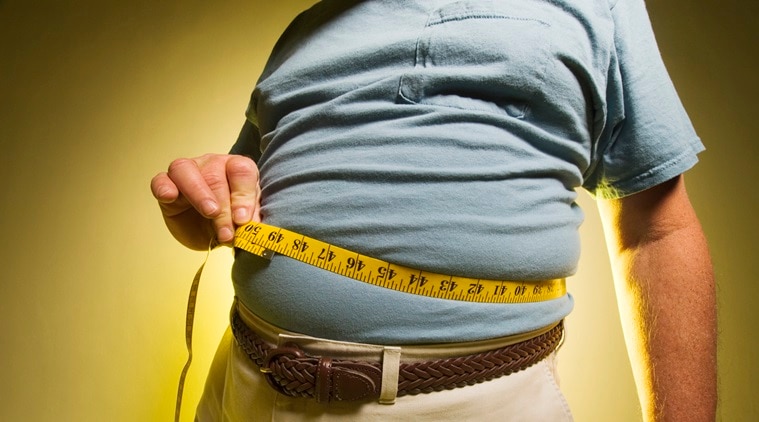"Obesity needs to be treated early. Reach out to qualified weight loss professionals and do not get swayed by all the information on the internet," said the bariatric surgeon, who is out with her new book

Since obesity is a silent killer and a precursor to many diseases like that of the heart, PCOD, joint-related issues, and more, bariatric operations have seen a rise across the world, said Dr Aparna Govil Bhasker, bariatric surgeon. And just like any other surgery, bariatric surgery — a type of weight loss surgery — requires one to make certain changes in diet and lifestyle habits. But that does not mean one needs to give up on their favourite foods, and that is exactly what the expert has shared in her new book, Bariatric Recipes – A Global Cookbook from India — penned along with her team and co-authored by dietitians Mariam Lakdawala, and Miloni Shah Sancheti.
“Food and diet are an integral part of any culture and the aim of bariatric surgery is not to take away the joy from the diet,” said Dr Aparna while sharing that one can find 85 recipes in the book, including those for gram dal and cabbage pancakes, ragi tikkis, healthy sliders, among others.
“When it comes to post-bariatric surgery diet, a lot of recipe books are available in the western world that can help patients. Till now, no such dietary resource was available for Indian patients. Indian diet is unique and different from its western counterpart. So the recipes in this book will go a long way to help patients to cope with post-surgery requirements,” she added.
Excerpts:
What led to the conceptualisation of the book?
This book is a great resource for patients who have undergone bariatric surgery. There is a big change in diet post the surgery and diet progression involves a liquid diet for 15 days followed by a semi-solid diet for another 15 days and then normal solid diet. With our experience of more than 15 years, we have seen our patients struggle to find interesting meal options for every phase of the diet. Hence, we thought of creating a resource that makes post-bariatric care easier and more enjoyable. These recipes are healthy and can be tried by anyone, even those who have not had surgery.
There is a general misconception that one cannot enjoy food after bariatric surgery. The surgery propels patients towards a healthier diet and lifestyle. Food is an integral part of our culture and the purpose of this book was to provide guidance about a healthy diet and yet not take away the joy from food. It is possible to relish cooking and eating food even after bariatric surgery for weight loss.
On what basis were the recipes chosen for the book?
All recipes were contributed by qualified dieticians from across the world. The recipes are divided into three types- liquid, semi-solid and solid recipes. They were chosen based on their nutritional composition. The focus is on high protein and less fats and calories per serve for every recipe.
Obesity is termed as a ‘silent killer’; can you explain?
Obesity is wrongly perceived as something that is self-inflicted, and often, a person with obesity is considered to be responsible. It still does not evoke the same level of sympathy as other diseases like heart disease or cancer. Obesity affects the body adversely — from head to toe. People with obesity are at higher risk of developing heart disease, diabetes, high blood pressure, dyslipidemia, lung and liver disease, joint issues, PCOD, infertility, gout and so on. Obesity leads to a poorer quality of life and is associated with many mental health issues, too. There is a huge gap when it comes to a deeper understanding of obesity. People still do not view it as a disease and hence they usually delay seeking treatment for the same. As in any other disease, early treatment is the key to success and treatment delayed is treatment denied, thus leading to worse outcomes.

What is bariatric surgery all about?
Bariatric surgery is presently the only effective therapy for weight loss for people with severe obesity. It also leads to significant improvement in all obesity-associated co-morbidities like diabetes, high blood pressure, heart disease, PCOD, joint issues, and liver disease.
The mere mention of the word “surgery” is enough to instill fear in people. However, surgery in the 21st century is much more advanced and safer. Bariatric surgery is now performed laparoscopically which entails 4 to 5 tiny sub-centimetre cuts. Laparoscopy is one of the kindest innovations of surgery and leads to lesser pain and an earlier recovery. Most patients get discharged within 48 hours of surgery and are back to work within a week. Bariatric surgery is as safe as any other surgery. In fact, the complication rate of bariatric surgery is lesser than other major surgeries.
What role does one’s diet play in managing lifestyle disorders like obesity?
Obesity is multi-factorial. An unhealthy diet is one of the factors contributing to weight gain in people who are predisposed to obesity. Out of the 12 or so factors that are known to cause obesity, there are only a few that can be modified by us. We cannot modify genetic factors. However, diet, physical activity, stress management and sleep hygiene are in our control to some extent. Hence, a healthy diet and lifestyle is an important prong of the treatment strategy when it comes to management of obesity.
How important is it to lose weight under expert guidance?
Obesity needs to be treated early. But please do not get swayed by all the information on the internet and reach out to qualified weight loss professionals. Expert guidance is needed for effective treatment.
How is a post-bariatric surgery diet different from regular homemade meals? Is it possible for everyone to embrace?
After bariatric surgery, diet progression includes- liquid diet for 15 days, semi-solid diet for the next 15 days followed by normal solid diet. However, patients are not able to consume large quantities at one go. Portions are restricted and hence the recipes included in the diet should be more nutrient-dense and at the same time less calorie-dense. In this collection of recipes, we have taken care that these requirements are met.
When it comes to post-bariatric diet, what are the top points to note?
Few important rules of a post-bariatric diet are:
*Diet must consist of nutrient dense foods.
*Protein and fibre rich foods must be added to every meal.
*Hydration must be maintained.
*Healthy eating behaviour must be encouraged – Eat slowly, chew well, avoid drinking liquids with meals, do not skip any meals and do not keep long gaps between the meals.
*Mindful eating must be encouraged.
Can people looking to lose weight also try these recipes?
Yes, these recipes can be included in the diet of those who want to lose or maintain weight. But following a healthy diet alone is not enough. It definitely has to be accompanied by physical activity, good sleep quality and stress management techniques in order to keep all lifestyle-related diseases at bay.
What are some myths related to obesity in India?
Myth 1: Obesity is not a disease
Obesity has emerged as one of the biggest killers of this century and urgent actions need to be taken to curtail this pandemic.
Myth 2: Eating less is the only solution to losing weight
Obesity is highly misunderstood and people usually equate food with weight gain. That is only partially true. In the recent years, we have moved away from this doctrine and now we know that obesity is multifactorial and food is just one factor responsible for the disease process. Hence the solution also cannot focus on food and diet alone. Strategy for obesity treatment needs to be multi-pronged.
Myth 3: A person weighing more is well nourished
Obesity is the other end of the spectrum of malnutrition and most of them have multiple nutritional deficiencies. Excess fat accumulation can lead to multiple deficiencies like vitamin D, iron and also has an undesirable effect on bone health.
Myth 4: A big belly is a sign of happiness and prosperity
A big belly actually signifies poor health. People with a big belly have a higher degree of visceral fat which can make them more prone to developing metabolic diseases, especially type 2 diabetes.
Myth 5: Obesity is the result of a lack of willpower and lethargy
This is one of the biggest myths and in the current scenario, I would say that it displays the lack of understanding about the disease. Obesity has nothing to do with will power or lethargy. More often than not, these are after effects of obesity and not the other way round.

What are other precautions that a post-bariatric patient should take?
Post-bariatric surgery patients have a very rewarding journey ahead. Some of the things they must take care of are-
*Focusing on healthy diet
*Having small portion sizes, chewing their food well and eating slowly.
*They must not combine food and fluids together
*They must stay away from sugar and high calorie foods
*Aerated drinks must be avoided as far as possible
*They must try to get 40-45 mins of moderate exercise 4 to 5 times a week
*Be regular with nutritional supplements
*Maintain a regular follow up with the bariatric team
For more lifestyle news, follow us: Twitter: lifestyle_ie | Facebook: IE Lifestyle | Instagram: ie_lifestyle
Source: Read Full Article
